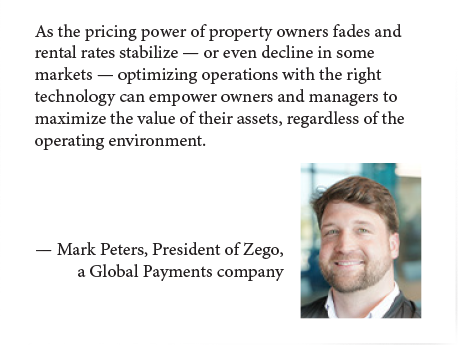— By Mark Peters, President of Zego, a Global Payments (NYSE: GPN) company
The pendulum that has swung in favor of property owners over the past four years appears to be swinging back toward renters — rapidly. Data from the CoStar Group show a dramatic deceleration in rent increases. At the same time, inflation, high interest rates and industry layoffs have combined to create a more challenging economic environment for multifamily property owners and operators.
As a result, many owner-operators are shifting away from a growth-oriented mindset, instead focusing on optimizing their portfolios and seeking innovative methods to improve operations and resiliency.
Property owners are increasingly turning to technology — particularly automation — to address issues such as ineffective rent collection, antiquated payment technology, costly invoicing processes and lackluster resident engagement programs that lead to higher turnover.
Maximizing Rent Collection
Rent collection challenges are part and parcel of owning and operating a community. In the current environment, this continual hassle is compounded by an uncertain economy in which rent increases have outpaced wages, putting pressure on tenants. Meanwhile, property management talent is in short supply, and rent collection is one of the least attractive parts of the job.
Fortunately, technology and automation are making it easier for managers to minimize transaction errors, prevent fraud and delinquent rent and ultimately protect revenue.
Streamlining the process of verifying funds when a resident pays rent is a simple but effective way to protect revenue and avoid the headaches of insufficient-fund notices and returned payments. Enabling payment through a resident’s bank account, for instance, eliminates the manual data entry errors that lead to unsuccessful payments and provides real-time balance verification.
Fixed-fee debit card options that make card transactions cost effective — paired with a provider who understands how to aggressively address chargebacks — can add an extra layer of protection. Some providers will even share in the costs associated with chargebacks.
Of course, verifying funds is only effective when funds are there to be verified. For tenants who struggle to make rent, offering easy, tech-enabled flexible payment options can ensure timely and full collection of rent. Flexible payment plans were previously limited to a small subset of consumer goods. However, now renters can sign up with flexible payment providers that pay rent on time and in-full on their behalf while accepting payments in installments that work best for renters’ budgets and cash flow. Solutions like this appeal to tenants who have irregular income sources and might otherwise fall behind.
Avoiding Utility Cost Fluctuations with Consumption-Based Billing
Volatility in the energy market is expected to continue, according to Willis Towers Watson. This represents a risk to multifamily property owners and operators, especially those who still charge a flat fee for utilities or include the cost in rent.
ENGIE Impact estimates that 17 percent of utility invoices contain an error. But with the right technology, correcting this does not have to be a manual, burdensome process. Property management automation platforms that incorporate machine learning and AI technology are highly effective at identifying clerical errors and unexplained surges in charges, as well as matching meter readings with audit numbers to ensure alignment and accuracy.
To effectively manage energy volatility, property managers should consider decoupling utilities from rent. When utilities are included in rent or residents are charged a flat fee, it leaves property owners vulnerable when prices fluctuate. Instead, sub-meters can be used in each residence to measure consumption, or property managers can divide the cost of utilities based on an equation that accounts for factors like the number of occupants and square footage.
Sub-metering is a system that allows a property management firm to bill tenants for individual measured utility usage. Sub-meters are a particularly effective tool because they can be used to provide tenants with automated insights about their usage, improving resident engagement and reducing the need to respond to questions about bills.
Increasing Resident Engagement and Reducing Turnover
According to Zego’s 2022 State of Resident Experience Management Report, the average cost to replace a single tenant is nearly $4,000. That’s why reducing resident turnover is one of the most effective strategies for property managers to maintain their bottom line. Attaining higher resident retention rates begins with understanding what is most important to modern renters, which includes the automated, at-your-fingertips conveniences they experience in other aspects of their lives.
To improve resident experience, property managers can implement a resident experience management platform that automates on-site and resident-facing tasks. These platforms can ease a variety of inconveniences, from automating move-in tasks to paying security deposits, providing package notifications and submitting digital maintenance requests.
Additionally, resident experience management platforms can provide actionable data that property managers can use to proactively identify areas for improvement. For example, if platform data indicate that most maintenance requests are submitted on Sunday evenings, property managers can schedule staff appropriately on Monday to minimize response times.
Rent collection challenges, utility expense management and resident turnover have a direct impact on revenue and net operating income. As the pricing power of property owners fades and rental rates stabilize — or even decline in some markets — optimizing operations with the right technology can empower owners and managers to maximize the value of their assets, regardless of the operating environment.
Mark Peters is president of Zego, a subsidiary of Global Payments Inc. (NYSE: GPN). Zego is a property management automation platform for multifamily and community associations, enabling clients to scale resources and make decisions with portfolio-wide visibility.

